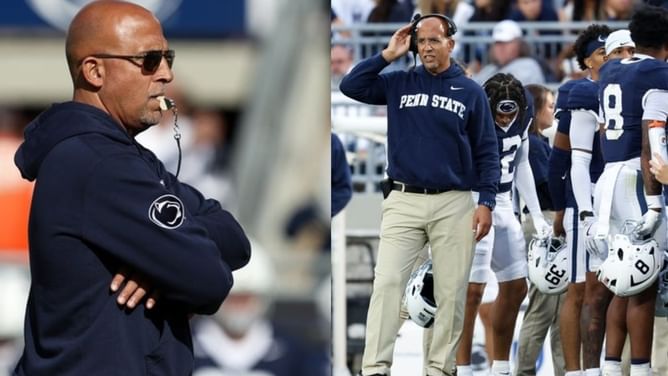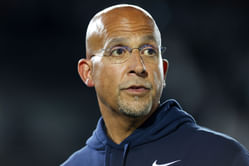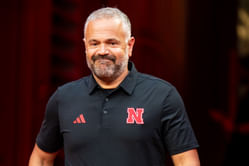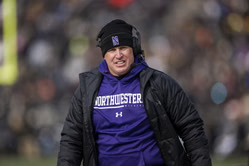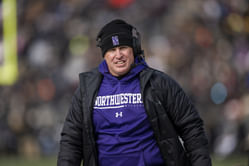Team Information
| Ground | Northwestern Medicine Field at Martin Stadium |
| City | Evanston, Illinois |
| Conference | Big Ten, |
| Nickname | Wildcats |
Northwestern Wildcats Football Bio
The Northwestern Wildcats football team competes in the Big Ten Conference, a prominent NCAA Division I league. Over the years, Northwestern has participated in various divisions within the Big Ten. From 2011 to 2013, during the Legends and Leaders divisional alignment, Northwestern was positioned in the Legends division. Post-2014, when the conference realigned into the East and West divisions, Northwestern became part of the West division. Throughout its history, Northwestern has engaged in competitive play within these conference divisions, showcasing its prowess in collegiate football.
| Name of the team | Northwestern Wildcats Football |
| First Season | 1882 |
| Athletic Director | Derrick Gragg |
| Head Coach | David Braun (1st season, 7–5 (.583)) |
| Stadium | Ryan Field (capacity: 47,130) |
| Location | Evanston, Illinois |
| Field Surface | Natural grass |
| Division | West |
| Conference | Big Ten Conference |
| Claimed National Titles | Not claimed |
| Conference Titles | 8 (1903, 1926, 1930, 1931, 1936, 1995, 1996, 2000) |
| Fight Song | Go U Northwestern |
| Mascot | Willie the Wildcat |
| Rivals | Illinois, Notre Dame, Michigan |
| Consensus All-Americans | Not available |
Northwestern Wildcats Football Introduction
The Northwestern Wildcats football team, an NCAA Division I member of the Big Ten Conference, represents Northwestern University in Evanston, Illinois, near Chicago. Established in 1882, football at Northwestern debuted amid growing campus interest. The Wildcats boast three Big Ten championships since 1995 and consistent bowl eligibility between 2015-2020. Renowned for high graduation rates, the team has played home games at Ryan Field (formerly Dyche Stadium) since 1926. Early successes, including the first Big Ten title in 1903 under Walter McCornack, and standout players like John "Paddy" Driscoll in 1915, marked the team's historic trajectory. The Wildcats' legacy intertwines early triumphs, setbacks, and influential player contributions.
Northwestern Wildcats Football History
Northwestern University's football history dates back to February 22, 1876, with an exhibition game between NU students and the Chicago Football Club. Initially an intramural sport, NU's team had its first intercollegiate game against Lake Forest in 1882. The Wildcats joined the Western Conference in 1896, showing promise with victories against prominent teams like Michigan and the University of Chicago.
After a period of success in the early 1900s, including NU's first Big Ten title under Walter McCornack in 1903, the suspension of intercollegiate football in 1905 temporarily halted the team's progress. The return in 1908 saw ups and downs until the arrival of John "Paddy" Driscoll in 1915, who brought hope and victories, notably breaking a 15-year Chicago winning streak.
The 1920s marked significant changes, with Glenn Thistlethwaite's coaching appointment and the construction of Dyche Stadium in 1926. The Wildcats gained acclaim after a 1925 upset against Michigan and a shared 1926 Western Conference Title.
The 1930s saw Lynn O. "Pappy" Waldorf's tenure, where Northwestern excelled, claiming conference titles and featuring standout players like Otto Graham. Robert W. "Bob" Voigts guided NU to a Rose Bowl win in 1949, the program's only victory until 1995. Lou Saban's sole year in 1955 ended winless.
The Ara Parseghian era from 1956 to 1963 brought Northwestern back into the spotlight. Despite a challenging start, Parseghian's tenure displayed resilience, witnessing victories over powerful teams like Michigan and Ohio State. Parseghian's leadership emphasized recruitment and resourcefulness, achieving Northwestern's top spot in the AP Poll 1962.
After Parseghian's departure, Alex Agase's tenure from 1964 to 1972 faced mixed results. While he led the Wildcats to second place in the Big Ten in 1970 and 1971, Northwestern's performance faltered afterward.
Northwestern's football legacy was characterized by periods of triumphs, struggles, and influential coaching, marking its place in collegiate football history.
Northwestern Wildcats Football Coach
David Braun, Northwestern's current head coach, rose from Winona State to coaching roles at Culver-Stockton, UC Davis, Northern Iowa, and North Dakota State. Named Northwestern's interim head coach in 2023, he led the team to a successful 7–5 season, a Bowl game, and a Las Vegas Bowl victory, earning Big Ten Coach of the Year.
| Years | Coach |
| 1882–1890 | No coach |
| 1891–1892 | Knowlton Ames |
| 1893 | Paul Noyes |
| 1894 | A. A. Ewing |
| 1895–1896 | Alvin H. Culver |
| 1897 | Jesse Van Doozer |
| 1898 | W. H. Bannard |
| 1899–1902 | Charles M. Hollister |
| 1903–1905 | Walter McCornack |
| 1908 | Alton Johnson |
| 1909 | Bill Horr |
| 1910–1912 | Charles Hammett |
| 1913 | Dennis Grady |
| 1914–1918 | Fred J. Murphy |
| 1919 | Charlie Bachman |
| 1920–1921 | Elmer McDevitt |
| 1922–1926 | Glenn Thistlethwaite |
| 1927–1934 | Dick Hanley |
| 1935–1946 | Pappy Waldorf |
| 1947–1954 | Bob Voigts |
| 1955 | Lou Saban |
| 1956–1963 | Ara Parseghian |
| 1964–1972 | Alex Agase |
| 1973–1977 | John Pont |
| 1978–1980 | Rick Venturi |
| 1981–1985 | Dennis Green |
| 1986–1991 | Francis Peay |
| 1992–1998 | Gary Barnett |
| 1999–2005 | Randy Walker |
| 2006–2022 | Pat Fitzgerald |
| 2023–present | David Braun |
Northwestern Wildcats Football Stadium: Ryan Field Stadium
Ryan Field, situated in Evanston, Illinois, serves as the Northwestern Wildcats' home turf in the Big Ten Conference. Built 97 years ago in 1926 and initially named Dyche Stadium after Evanston's former mayor and Northwestern alumnus William Dyche, the stadium underwent a transformation in 1997, rebranded as Ryan Field to honor the Ryan family's significant contributions to Northwestern. With a current seating capacity of 47,130, it notably stands as the sole FBS stadium lacking permanent lighting. Originally crafted with semi-circular grandstands and later augmented with end zone seating and the construction of McGaw Memorial Hall in 1952, the stadium underwent surface alterations from natural grass to artificial turf in 1973, reverting back to natural grass in 1997 with modifications to improve sight lines. Beyond football, Ryan Field boasts a historical significance, hosting various events, including the 1932 Women's and 1948 Men's US Olympic Trials for track and field, NCAA championships in 1943, and the summer College All-Star Games in 1943 and 1944, emphasizing its multifaceted role in sporting history.
Northwestern Wildcats Football Rivals
The Northwestern Wildcats Football team engages in riveting matchups with several historic rivals. The Illinois Fighting Illini rivalry is a testament to longevity, dating back to 1892 and featuring annual clashes since 1927, with Illinois holding a slight 57–54–5 edge. The series is marked by the Land of Lincoln Trophy, contested since 2009, replacing the retired Sweet Sioux Tomahawk Trophy due to NCAA regulations. Northwestern's gridiron history with Notre Dame, from the 1920s to sporadic meetings, witnessed memorable upsets, notably the 1995 shocker. Despite Notre Dame leading the series 38–9–2, recent clashes reignited the fervor. The historic ties with the University of Chicago, a past fierce rivalry between the two Chicago-based institutions, played a pivotal role in Northwestern's football prominence, marking an era until Chicago departs from the Big Ten. In 2021, Northwestern and Michigan announced the George Jewett Trophy, honoring the first African-American Big Ten player, further enriching their rivalry dating back to 1892, with Michigan holding a notable 58–15–2 lead.
Northwestern Wildcats Football Record and stats
The Northwestern Wildcats Football team concluded their season with a 7-5 record, showcasing a blend of individual prowess and team dynamics. Notable performances included Ben Bryant's 1,807 passing yards and 13 touchdowns, while Cam Porter led in rushing with 651 yards, and a formidable defense amassed 30 sacks during the season.
Conference championships
| Year | Conference | Coach | Record | Conference Record |
| 1903† | Western Conference | Walter McCornack | 10–1–3 | 1–0–2 |
| 1926† | Big Ten Conference | Glenn Thistlethwaite | 7–1 | 5–0 |
| 1930† | Big Ten Conference | Dick Hanley | 7–1 | 5–0 |
| 1931† | Big Ten Conference | Dick Hanley | 7–1–1 | 5–1 |
| 1936 | Big Ten Conference | Lynn Waldorf | 7–1 | 6–0 |
| 1995 | Big Ten Conference | Gary Barnett | 10–2 | 8–0 |
| 1996† | Big Ten Conference | Gary Barnett | 9–3 | 7–1 |
| 2000† | Big Ten Conference | Randy Walker | 8–4 | 6–2 |
Division championships
| Year | Division | Coach | Opponent | CG result |
| 2018 | Big Ten – West | Pat Fitzgerald | Ohio State | L 24–45 |
| 2020 | Big Ten – West | Pat Fitzgerald | Ohio State | L 10–22 |
Northwestern Wildcats Football Roster
The Northwestern Wildcats Football team's roster showcases a blend of seasoned talent and emerging potential across offense and defense. The offense boasts a diverse quarterback lineup featuring senior Ben Bryant from La Grange, IL, alongside junior Cole Freeman from Summit, NJ, and freshman Aidan Gray from Naperville, IL, among others. The running back corps is led by senior Jake Arthurs, hailing from Wheaton, IL, senior Marcus Cisco from Byron Center, MI, and sophomore Joseph Himon II from Little Rock, AR. On the defensive front, stalwarts such as junior Carmine Bastone representing St. Charles, IL, senior Jaiden Cameron from Clayton, OH, and sophomore Brendan Flakes from Winter Garden, FL, fortify the line. Freshmen talents like Tyler Gant from St. Louis, MO, and Mason Green from Brentwood, TN, add depth to the defensive roster, complementing the experienced players like senior Richie Hagarty from New Palestine, IN, and senior Sean McLaughlin from Frankfort, IL, providing a robust and versatile unit aiming for success in the forthcoming season.
Northwestern Wildcats Football Schedule
The Northwestern Wildcats Football team commenced their season with a challenging away game against Rutgers, resulting in a disappointing loss with a score of 24-7. However, they swiftly recovered by dominating UTEP in a home game the following week, securing a convincing win of 38-7. The team struggled against Duke, falling short with a 38-14 loss, but rallied back with an impressive overtime victory against Minnesota, triumphing 37-34. Despite their efforts, they encountered a setback against Penn State, succumbing to a 41-13 defeat. Northwestern showcased resilience, securing narrow victories against Howard (23-20) and Maryland (33-27) before experiencing a couple of tough losses to Nebraska (17-9) and Iowa (10-7). The team regained momentum with notable wins against Wisconsin (24-10), Purdue (23-15), and Illinois (45-43) in the final games of their season, finishing with a 7-5 overall record, with a 5-4 standing in conference play.
FAQs
Northwestern clinched their first Big Ten Conference title in football in the year 1903 under the coaching of Walter McCornack.
Prior to the 2014 conference realignment, Northwestern was a part of the Legends division within the Big Ten Conference.
Ryan Field, the Wildcats' home turf since 1926, hosted significant events such as NCAA championships in 1943 and the US Olympic Trials in 1932 and 1948 for track and field.
Some notable coaches in Northwestern football history include Walter McCornack, Ara Parseghian, and Lynn O. "Pappy" Waldorf, among others, who left a significant impact on the team.
The 2023 season saw the Wildcats under the guidance of Coach David Braun finishing with a 7-5 record, a Bowl game appearance, and a victory at the Las Vegas Bowl, earning Coach Braun the Big Ten Coach of the Year accolade.
